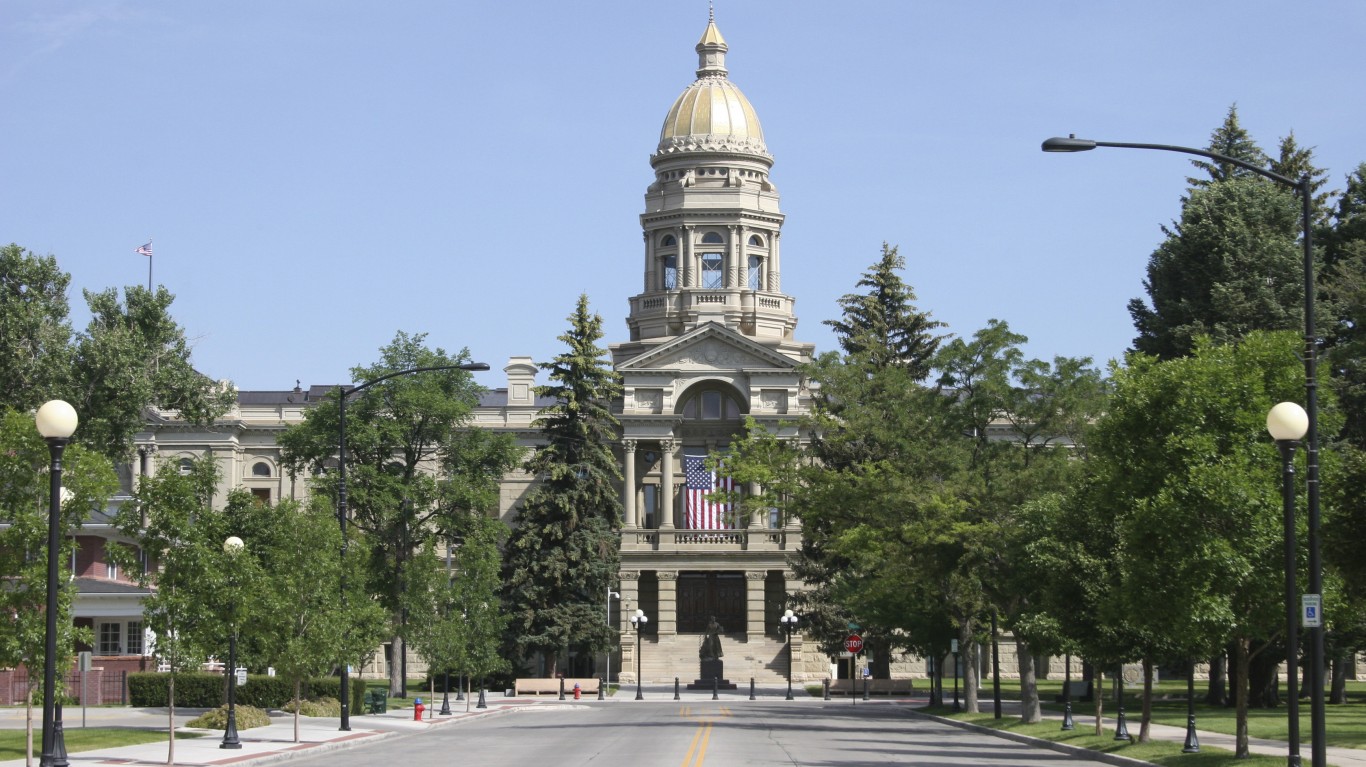
A recent PBS NewsHour/NPR/Marist poll shows that a majority of Americans oppose laws that would ban gender-affirming medical care for minors, but the number of Americans who say they support such laws has risen by 15 percentage points, to 43%, over the past year.
This jump in support for banning medical treatments like surgery, puberty blockers, and hormone therapy for transgender minors comes as conservative lawmakers have flooded state legislatures with an avalanche of bills targeting transgender young people in particular and LGBTQ people in general. (These are the most LGBTQ-friendly cities in America right now.)
In a recent statement to PBS NewsHour, Jonah DeChants, senior research scientist at The Trevor Project, a group focused on suicide prevention among LGBTQ youths, blames some of this on “irresponsible news coverage across both mainstream and right-wing outlets.”
Almost 120 of these legislative proposals pertain to health care, targeting access to medically necessary treatments for transgender people through programs like Medicaid and bans on gender-affirming medical care for minors. Some bills seek to block insurance coverage for gender-affirming health care to transgender people of any age. Other proposals would carve out exemptions that can force trans youth into treatments against their will, according to the ACLU.
To determine which states are restricting transgender health care, 24/7 Tempo reviewed data on anti-trans health care legislation by state from Axios. The legislative status of anti-trans bills are current as of March 23, 2023. The 31 states with pending or active anti-trans legislation are ordered alphabetically. (These are the worst American states for health care.)
Kansas, South Carolina, and Oklahoma are proposing bans that not only target minors but anyone under the age of 21. A bill in Texas would ban gender affirming medical care for trans people under the age of 26. Some bills seek to give people who received gender-affirming care as minors to sue for medical malpractice well into their adulthood, well beyond the typical statute of limitations for such civil litigation.
Click here to read more about 31 states that are criminalizing gender-affirming health care
These laws, “would interfere with parental rights and decision making that should be based on discussions between physicians, parents, and children,” the United States Professional Association for Transgender Health said in a statement last year amid a rise in these state bills targeting transgender youth.
This year alone, 117 bills have been introduced in the legislatures of 31 states that would limit or ban gender-affirming care for transgendered people. Responding to critics who claim such treatment is harmful and experimental, leading medical associations deem these treatments as medically necessary. The most controversial of these medical procedures – sexual reassignment surgery – is extremely rare and limited to teens.

1. Arizona
> Anti-trans health care legislation status: Law enacted
> Governor political affiliation: Democrat
> Senate majority political affiliation: Republican
> House majority political affiliation: Republican
In March 2022, Arizona’s Gov. Doug Ducey, a Republican, signed into law a bill passed by the GOP-led legislatures that bans gender-affirming health care for minors. The law went into effect in March, two months after newly elected Arizona Gov. Katie Hobbs, a Democrat, was sworn into office.
[in-text-ad]

2. Arkansas
> Anti-trans health care legislation status: Law enacted
> Governor political affiliation: Republican
> Senate majority political affiliation: Republican
> House majority political affiliation: Republican
In March, Arkansas governor Sarah Huckabee Sanders signed into law legislation that makes it easier to sue providers of gender-affirming care for medical malpractice. Under the new law, anyone who received gender-affirming care as a minor can sue their doctors until the recipients of such treatment turn 33 years of age.

3. Florida
> Anti-trans health care legislation status: Bill introduced
> Governor political affiliation: Republican
> Senate majority political affiliation: Republican
> House majority political affiliation: Republican
On March 16, Florida became the eighth state to ban trans-related medical care for minors, though minors that have already started puberty blockers and hormone therapy may continue to do so. The law bans gender-affirming surgery on minors.

4. Georgia
> Anti-trans health care legislation status: Bill passed at least one legislative chamber
> Governor political affiliation: Republican
> Senate majority political affiliation: Republican
> House majority political affiliation: Republican
On March 23, Georgia Gov. Brain Kemp signed into law a ban on most gender-affirming surgeries and hormone-replacement therapies. Doctors will still be able to prescribe puberty blockers to minors and children already receiving hormone therapies will continue to be allowed to continue the treatment.
[in-text-ad-2]

5. Hawaii
> Anti-trans health care legislation status: Bill introduced
> Governor political affiliation: Democrat
> Senate majority political affiliation: Democrat
> House majority political affiliation: Democrat
A bill advancing through Hawaii’s House of Representatives would ban gender-affirming surgery for minors and make it a felony for doctors to perform this procedure on anyone under the age of 18. Hawaii is a heavily Democratic state, and in June 2022, Gov. David Ige signed three bills protecting LGBTQ people – including one that would prevent insurers from discriminating against people seeking gender-affirming care.

6. Idaho
> Anti-trans health care legislation status: Bill passed at least one legislative chamber
> Governor political affiliation: Republican
> Senate majority political affiliation: Republican
> House majority political affiliation: Republican
On March 28, Idaho’s House of Representatives approved a bill that would ban and criminalize gender-affirming care for minors, a day after the state Senate passed an amended version of the bill. Idaho governor Brad Little received the bill on March 30 for his signature or veto.
[in-text-ad]

7. Indiana
> Anti-trans health care legislation status: Bill passed at least one legislative chamber
> Governor political affiliation: Republican
> Senate majority political affiliation: Republican
> House majority political affiliation: Republican
On March 27, Gov. Eric Holcomb received a bill to sign or veto that would prohibit gender-affirming treatments and surgeries for minors. Days earlier, the governor said parents have both “a right” and “the responsibility” to look after their children’s “health and well-being.”

8. Iowa
> Anti-trans health care legislation status: Law enacted
> Governor political affiliation: Republican
> Senate majority political affiliation: Republican
> House majority political affiliation: Republican
On March 23, Iowa governor Kim Reynolds signed into law a prohibition on gender-affirming medical care for minors, two days after she claimed that more research was needed about the efficacy and safety of these treatments. Reynolds also signed a separate bill banning trans students from entering school bathrooms or changing rooms based on their gender identities.

9. Kansas
> Anti-trans health care legislation status: Bill passed at least one legislative chamber
> Governor political affiliation: Democrat
> Senate majority political affiliation: Republican
> House majority political affiliation: Republican
In Kansas, Oklahoma, and Texas, it’s not only minors who are banned from gender-affirming medical care. Bills in these states proposed extending the ban on such procedures to adults as old as 26, according to Axios news service. In March, Kansas governor Laura Kelly vetoed a bill that would have banned gender-affirming care for minors.
[in-text-ad-2]

10. Kentucky
> Anti-trans health care legislation status: Bill passed at least one legislative chamber
> Governor political affiliation: Democrat
> Senate majority political affiliation: Republican
> House majority political affiliation: Republican
In an unusual move, Kentucky lawmakers voted to overturn Gov. Andy Beshear’s veto of a bill that included a ban on gender-affirming medical care for minors. Though Republicans don’t control the governorship, they hold supermajorities in the state’s House of Representatives and Senate.

11. Michigan
> Anti-trans health care legislation status: Bill introduced
> Governor political affiliation: Democrat
> Senate majority political affiliation: Democrat
> House majority political affiliation: Democrat
On March 9, Michigan House Bill 4257 was referred to a committee, marking its first step toward advancing into law. The bill would classify gender-affirming medical care for minors as child abuse committed by any parent, guardian, and medical professional who “knowingly or intentionally consents to, obtains, or assists with a gender transition procedure for a child.”
[in-text-ad]

12. Mississippi
> Anti-trans health care legislation status: Law enacted
> Governor political affiliation: Republican
> Senate majority political affiliation: Republican
> House majority political affiliation: Republican
On Feb. 28, Mississippi governor. Tate Reeves signed into law a bill prohibiting gender-affirming medical treatments for minors, shortly after Utah and South Dakota instituted the same ban. The governor called such treatments “pseudo-science” advanced by “radical activists, social media, and online influencers [trying] to convince our children that they are in the wrong bodies.”

13. Missouri
> Anti-trans health care legislation status: Bill introduced
> Governor political affiliation: Republican
> Senate majority political affiliation: Republican
> House majority political affiliation: Republican
On March 21, the Missouri Senate advanced a bill prohibiting gender-affirming health care for minors and a separate bill prohibiting transgender minors from competing in school sports based on their gender identity. Senators agreed to include a provision allowing minors already receiving hormone treatment or puberty-blocking drugs to continue to receive those therapies.

14. Montana
> Anti-trans health care legislation status: Bill passed at least one legislative chamber
> Governor political affiliation: Republican
> Senate majority political affiliation: Republican
> House majority political affiliation: Republican
The Montana Senate passed a final vote on a bill along party lines to prohibit gender-affirming medical care for minors diagnosed with gender dysphoria, though it allows treatments like breast reduction surgery and puberty blockers for young cisgender people, according to the Associated Press. The bill is on Gov. Greg Gianforte’s desk for approval or veto.
[in-text-ad-2]

15. Nebraska
> Anti-trans health care legislation status: Bill introduced
> Governor political affiliation: Republican
> Senate majority political affiliation: N/A
> House majority political affiliation: N/A
A bill to restrict gender-affirming medical care to people until the age of 19 advanced in the state’s nonpartisan legislature on March 23. The bill advanced through cloture, a procedural motion to end a debate, with the minimum required votes.

16. New Hampshire
> Anti-trans health care legislation status: Bill introduced
> Governor political affiliation: Republican
> Senate majority political affiliation: Republican
> House majority political affiliation: Republican
Republican state lawmakers sponsored a sweeping bill in early March that includes a ban on gender-affirming medical care for minors, as well as a prohibition on K-12 trans students from using bathrooms that align with their gender identities. A separate bill would categorize gender-affirming medical care as child abuse.
[in-text-ad]

17. New Jersey
> Anti-trans health care legislation status: Bill introduced
> Governor political affiliation: Democrat
> Senate majority political affiliation: Democrat
> House majority political affiliation: Democrat
Republican lawmakers have introduced a bill in New Jersey to prohibit gender-affirming treatments and surgeries for minors. In February, state Democratic senators answered this bill with their own – one that would prohibit state officials from cooperating with other states in enforcing anti-transgender laws, enabling extraditions, cooperating with subpoenas, and sharing medical records. It would also grant state courts greater power in child custody cases involving gender-affirming care.

18. North Carolina
> Anti-trans health care legislation status: Bill introduced
> Governor political affiliation: Democrat
> Senate majority political affiliation: Republican
> House majority political affiliation: Republican
In early February, North Carolina House Republicans proposed banning gender-affirming medical care for minors and making it illegal for doctors to “facilitate the minor’s desire to present or appear in a manner that is inconsistent with the minor’s sex.” Under the proposal, doctors could lose their license to practice medicine and would face a penalty of up to $1,000 for each violation for removing “nondiseased” body parts.

19. North Dakota
> Anti-trans health care legislation status: Bill passed at least one legislative chamber
> Governor political affiliation: Republican
> Senate majority political affiliation: Republican
> House majority political affiliation: Republican
The North Dakota legislature is advancing a bill that prohibits doctors from providing gender-affirming medical care to transgender minors while allowing cisgender youths in need of similar or identical treatments for other issues to receive that care. Cisgender youths identify with the gender that matches the sex assigned to them at birth.
[in-text-ad-2]

20. Ohio
> Anti-trans health care legislation status: Bill introduced
> Governor political affiliation: Republican
> Senate majority political affiliation: Republican
> House majority political affiliation: Republican
In February, Ohio House Republicans introduced a bill that would prohibit gender-affirming medical care for minors and would require minors currently taking hormone therapies to cease treatment within 180 days. Doctors and therapists could be penalized by the state attorney general for referring patients to out-of-state providers.

21. Oklahoma
> Anti-trans health care legislation status: Bill passed at least one legislative chamber
> Governor political affiliation: Republican
> Senate majority political affiliation: Republican
> House majority political affiliation: Republican
Oklahoma is one of several red states with a lengthy list of legislative bills targeting transgender health care. The ACLU counts 15 health-care-related bills in addition to 20 other bills, mostly targeting transgender K-12 students. Only two other states have more anti-trans bills in 2023: Texas, with 51, and Missouri, with 48. Oklahoma House Bill 2177 would ban gender-affirming medical care for minors and prohibit insurers from covering all transgender care regardless of a person’s age.
[in-text-ad]

22. Oregon
> Anti-trans health care legislation status: Bill introduced
> Governor political affiliation: Democrat
> Senate majority political affiliation: Democrat
> House majority political affiliation: Democrat
The Oregon Senate has two health-care-related bills targeting transgender people. One prohibits state correctional facilities from paying for, providing, or enabling gender-affirming care to individuals who are in custody. The other bill would ban gender-reassignment surgeries for minors.

23. Pennsylvania
> Anti-trans health care legislation status: Bill introduced
> Governor political affiliation: Democrat
> Senate majority political affiliation: Republican
> House majority political affiliation: Uncertain
Relative to other states that have aggressively proposed anti-trans legislation, Pennsylvania has very few legislative actions on the dockets so far in 2023. State House Republicans have introduced three bills, including one that would allow minors who received transgender medical care to sue doctors for the treatments or surgeries until they reach 30 years of age.

24. South Carolina
> Anti-trans health care legislation status: Bill introduced
> Governor political affiliation: Republican
> Senate majority political affiliation: Republican
> House majority political affiliation: Republican
A bill introduced in the state senate in March bans gender-affirming care for minors and bars state funds from providing such care to anyone regardless of age. The bill would also require school officials to notify parents if they suspect a student is showing signs of gender dysphoria or identification with a gender that is different from their biological sex assigned to them at birth.
[in-text-ad-2]

25. South Dakota
> Anti-trans health care legislation status: Law enacted
> Governor political affiliation: Republican
> Senate majority political affiliation: Republican
> House majority political affiliation: Republican
On Feb. 13, South Dakota Gov. Kristi Noem signed into law a bill prohibiting gender-affirming medical care for minors. As elsewhere, opponents of the bill came forward to argue that treatments like hormone therapy and puberty blockers help minors with gender dysphoria and reduced the risk of suicide, and that bills like this amount to government overreach into health care decisions that should be made by parents and medical professionals.

26. Tennessee
> Anti-trans health care legislation status: Law enacted
> Governor political affiliation: Republican
> Senate majority political affiliation: Republican
> House majority political affiliation: Republican
On March 2, Tennessee Gov. Bill Lee signed into law a total ban on gender-affirming medical care for minors. Children currently taking medications like hormone therapy and puberty blockers must cease these treatments by the end of March 2024. The bill was fast-tracked by a Republican legislative supermajority and will go into effect this summer unless it’s blocked by a judge or a successful civil lawsuit.
[in-text-ad]

27. Texas
> Anti-trans health care legislation status: Bill introduced
> Governor political affiliation: Republican
> Senate majority political affiliation: Republican
> House majority political affiliation: Republican
When it comes to anti-trans bills in 2023, the Texas legislature leads the nation. The Lone Star State has 51 bills targeting transgender individuals, followed by Missouri with 48 and Oklahoma with 35. Of those, 14 target gender-affirming medical care. Texas Republicans have been so aggressively pursuing anti-trans bills related to medical care that they had to recently scale back their proposed blanket ban on hormone treatment and puberty blockers to allow minors that are already taking these treatments to continue their care.

28. Utah
> Anti-trans health care legislation status: Law enacted
> Governor political affiliation: Republican
> Senate majority political affiliation: Republican
> House majority political affiliation: Republican
Utah became the first state in 2023 to ban gender-affirming care for minors, including “an indefinite moratorium on their access to puberty blockers and hormone therapy,” NBC News reported. The law also broadens the ability to pursue medical malpractice against doctors by any individual who “later disaffirms consent” to the treatments as an adult.

29. Virginia
> Anti-trans health care legislation status: Bill introduced
> Governor political affiliation: Republican
> Senate majority political affiliation: Democrat
> House majority political affiliation: Republican
Bills targeting gender-affirming medical care to minors have been defeated in Virginia. “There are no longer any anti-trans bills in the Virginia General Assembly that have a path to passage in the 2023 legislative session,” the non-profit LGBTQ+ rights group Equality Virginia announced in February. Four Senate bills related to transgender medical care have died in committee this year.
[in-text-ad-2]

30. West Virginia
> Anti-trans health care legislation status: Bill passed at least one legislative chamber
> Governor political affiliation: Republican
> Senate majority political affiliation: Republican
> House majority political affiliation: Republican
On March 29, West Virginia governor Jim Justice signed into law a ban on gender-affirming care for minors, including reversible treatments like puberty blockers. The bill also bans gender reassignment surgeries for minors, though – as in other states where Republicans have proposed or instituted this ban – such surgery has never been performed in West Virginia, according to physicians cited by the Associated Press.

31. Wyoming
> Anti-trans health care legislation status: Bill passed at least one legislative chamber
> Governor political affiliation: Republican
> Senate majority political affiliation: Republican
> House majority political affiliation: Republican
Two Wyoming Senate bills targeting gender-affirming health care died this year as they failed to get introduced into the state House of Representatives. One bill would have made it a felony to provide gender-reassignment surgery or reversible non-surgical treatments to minors. The other bill would have revoked the medical licenses of doctors providing gender-affirming health care to minors and would have prohibited insurers from covering this medical care for people of any age.
In 20 Years, I Haven’t Seen A Cash Back Card This Good
After two decades of reviewing financial products I haven’t seen anything like this. Credit card companies are at war, handing out free rewards and benefits to win the best customers.
A good cash back card can be worth thousands of dollars a year in free money, not to mention other perks like travel, insurance, and access to fancy lounges.
Our top pick today pays up to 5% cash back, a $200 bonus on top, and $0 annual fee. Click here to apply before they stop offering rewards this generous.
Flywheel Publishing has partnered with CardRatings for our coverage of credit card products. Flywheel Publishing and CardRatings may receive a commission from card issuers.
Thank you for reading! Have some feedback for us?
Contact the 24/7 Wall St. editorial team.
 24/7 Wall St.
24/7 Wall St.
